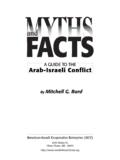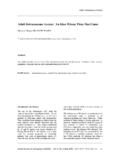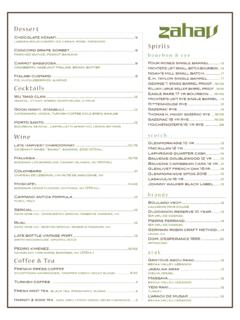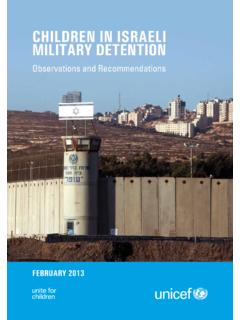Transcription of Israeli-Palestinian conflict - Caabu
1 The conflict between Palestinian Arabs and Israelis is a modern phenomenon, which began around the turn of the 20th century. The views of the opposing sides are generally very polarised and many historical events continue to be the subject of argument, which can be very off-putting for anyone who is just beginning to find out about the issues. In a way, we could talk about there being an israeli narrative and a Palestinian narrative representing the different perspectives on the conflict but as you learn more about the conflict , you will also learn that there are different views amongst both Israelis and palestinians . Caabu Israeli-Palestinian conflict Caabu Roots of the Israeli-Palestinian conflict Refugees International law and human rights International responsibility Find out what the issues are. Why do people disagree so strongly? Israel/Palestine is a small area: approximately 10,000 square miles, or about the size of Wales!
2 Yet the events on this tiny bit of land have a massive impact not only on the Middle East region but on world affairs. Sometimes the conflict is referred to as the Israeli-Palestinian conflict and sometimes the Arab- israeli conflict . Here, we will focus on the Palestinian aspects. But what happens in Israel/Palestine has repercussions in the whole of the Arab world. Armed conflict associated with Israel has been particularly severe in Lebanon. Israeli-Palestinian conflict Palestinian claims to the land Zionist claims to the land palestinians claims to the land are based on continuous residence in the country for centuries and the fact that they were the majority. They reject the idea that a kingdom in biblical times can be the basis for a valid modern claim. They do not believe they should give up their land and homes to compensate Jews for Europe's crimes against them. Jewish claims to the land are based on the biblical promise to Abraham and his descendants and on the fact that this was the historical site of the Jewish kingdom of Israel (which was destroyed by the Roman Empire).
3 They see a homeland for the Jews as the only possible haven from European anti-Semitism. The conflict is often presented as a religious one fuelled by religious hatred. But it is better understood as a conflict rooted in politics not religion. A central part of this politics is competing claims over land. Until 1948, the area that both groups claimed was known as Palestine. But this all changed in 1948 when the land was divided into three parts: Israel, the West Bank and the Gaza Strip. A land without a people for a people without a land was a key Zionist slogan. What problems are there with this slogan? Was it really a land without a people? What was the land called and who were the people? Ignoring the palestinians in Palestine meant the Zionists were denying reality or saying that palestinians did not really What do you think? Zionism is a modern political movement.
4 Its central belief is that there should be a homeland for the Jewish people in the land of Israel. Therefore it conceives of Jewish people not simply as sharing a religious or ethnic identity, but as a national group entitled to their own state. Zionism was born as a reaction to European anti-Semitism. Theodor Herzl, considered the founder of modern Zionism, argued that the only way for Jews to be free from European anti-Semitism and for them to be able to create their own destiny was if they had a state. It was the Holocaust the mass extermination of Jews on European soil that enhanced support amongst Jews and internationally for the idea of a Jewish state. Theodor Herzl considered founder of modern Zionism What is Zionism? Why Israel? Zionism is a secular ie non-religious movement, but it does draw on Jewish religious attachment to Jerusalem and the Land of Israel and an idea that the Jews were returning to Israel after a 2000 year absence.
5 But the politics of Zionism was mainly influenced by nationalist and colonial ideas about Europeans' right to claim and settle other parts of the world. Britain as a world power: contradictory promises? Promise to the Arabs the Hussein-McMahon correspondence During the First World War, McMahon, the British High Commissioner in Egypt tried to encourage an Arab revolt against the Ottoman Empire which ruled over large parts of the Arab world and was aligned with Germany against Britain and France in the war. In a series of ten letters from 1915 to 1916 with Ali Ibn Husain, Sherif of Mecca, McMahon promised that if the Arabs supported Britain in the war and Hussein led an Arab revolt, the British government would support the independence of what would later be called Palestine, Transjordan, Syria and Iraq.
6 But Britain made other promises during the war that conflicted with the Hussein-McMahon understandings. In 1917, the British Foreign Minister, Lord Arthur Balfour, issued a declaration (the Balfour Declaration) announcing his government's support for the establishment of a Jewish national home in Palestine. "His Majesty's Government view with favour the establishment in Palestine of a national home for the Jewish people, and will use their best endeavours to facilitate the achievement of this object A third promise, in the form of a secret agreement, was a deal that Britain and France struck between themselves to carve up the Arab provinces of the Ottoman Empire and divide control of the region. Does Britain have a legacy of responsibility in the region? The number of Jews moving to Palestine sharply increased. Some went as part of a belief in establishing a Jewish homeland and others went to escape anti-Semitic persecution.
7 Many countries including Britain restricted the number of Jews allowed in when the Nazis came to power in Germany in 1933 and this had a major impact on Palestine. The rising tide of European Jewish immigration, land purchases and settlement in Palestine generated increasing resistance by Palestinian peasants, journalists and political figures. Palestinian resistance to British control and Zionist settlement climaxed with the largely peaceful Arab revolt of 1936-39 which was brutally suppressed. In an effort to maintain order in an increasingly tense environment, the British tried to limit future Jewish immigration and land purchases. The Zionists regarded this as a betrayal, and the British-Zionist alliance came to an end. Promise to the Zionists the Balfour Declaration Secret agreement with the French Sykes-Picot Agreement After the first world war, Britain and France convinced the new League of Nations (which was the forerunner to the United Nations) to give them territories as mandates.
8 The idea was that Britain and France would administer these areas until the people there were ready to rule themselves. Britain obtained a mandate over the areas which are now Israel, the West Bank, the Gaza Strip and Jordan. British mandate Following World War II, with escalating hostilities between palestinians and Zionists over the fate of Palestine and between the Zionist militias and the British army, Britain requested that the recently established United Nations determine the future of Palestine. The UN General Assembly passed Resolution 181 in 1947 which would partition Palestine into two states, one Jewish and the other Arab, with the area of Jerusalem and Bethlehem as an international zone. The Zionist leadership publicly accepted the UN partition plan. The Palestinian Arabs and the surrounding Arab states rejected the UN plan. Israelis refer to the year 1948 as the Year of Independence.
9 palestinians refer to 1948 as al nakba , meaning the disaster or the catastrophe . Fighting intensified between the Arab and Jewish residents of Palestine days after the adoption of the UN partition plan. The Arab military forces were poorly organised, trained and armed, in contrast to the Zionist military forces, which though numerically smaller, were well organised, trained and armed. On May 15, 1948, the British evacuated Palestine, and Zionist leaders proclaimed the state of Israel. Armies from the neighbouring Arab countries and Iraq entered Palestine, declaring that they were coming to the assistance of the palestinians , but they were no match for Israel. The Palestinian Arab state envisioned by the UN partition plan was never established. In 1949, with the end of the war between Israel and the Arab states, the country once known as Palestine was divided into three parts.
10 The State of Israel encompassed over 77 percent of the territory. (The land now incorporated into Israel which had not been allotted to it in the Partition Plan is shown on the map). Of the remainder of Palestine, the larger part the West Bank became part of Jordan and Egypt took over the administration of a small area on the Mediterranean coast, the Gaza Strip. Over 750,000 palestinians fled for their lives, leaving behind their homes and belongings and becoming refugees. How practical was this proposed partition plan? What other alternatives were there? Should the Arabs have accepted the partition plan? The plan proposed in Resolution 181 granted the Jewish minority more than 50% of the land though they made up just one third of the population and owned under 10% of the land. 1948: The Year of Independence , or the Catastrophe ? Is objective history possible? Is it possible to have an account of this history which incorporates the different perspectives?







